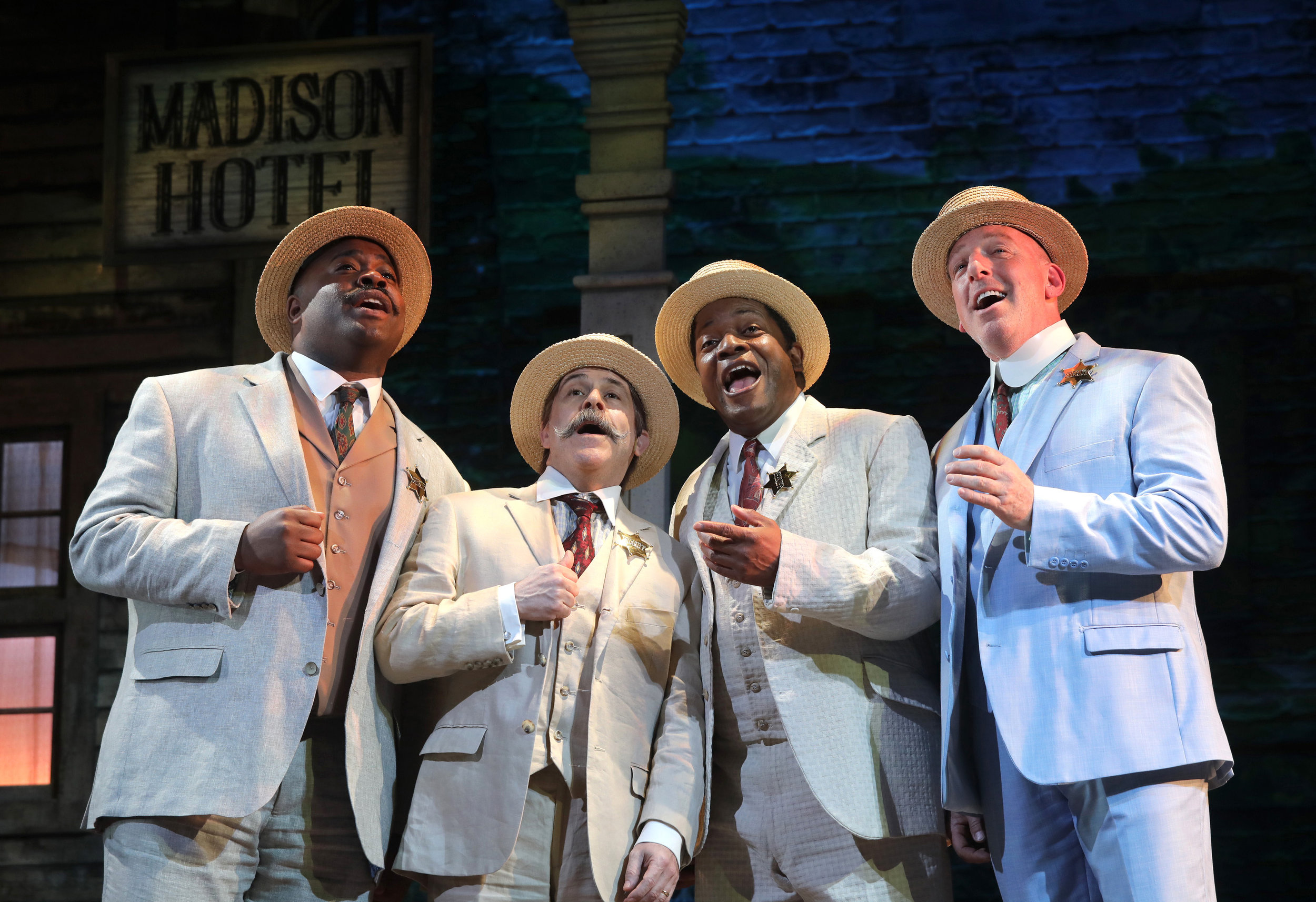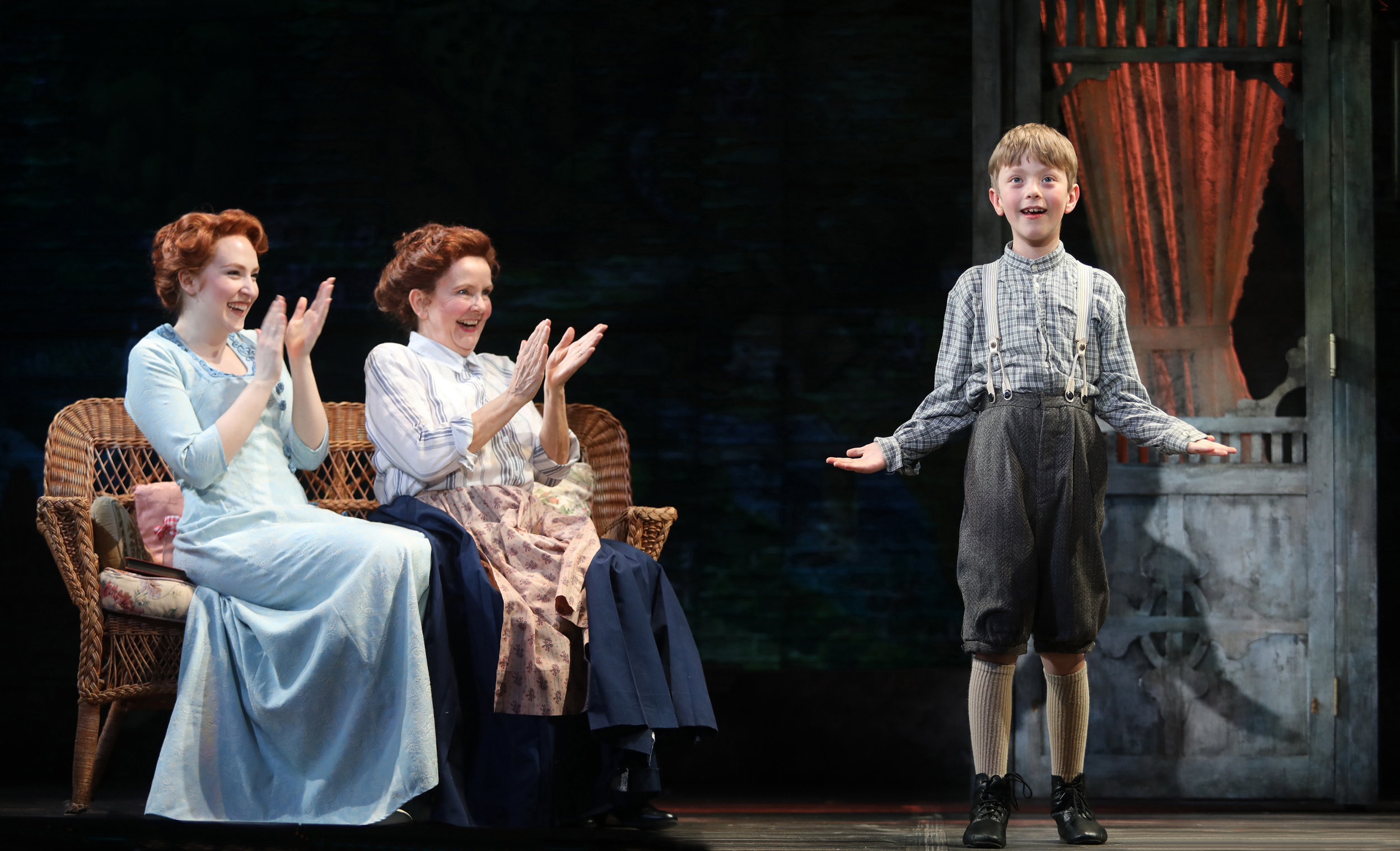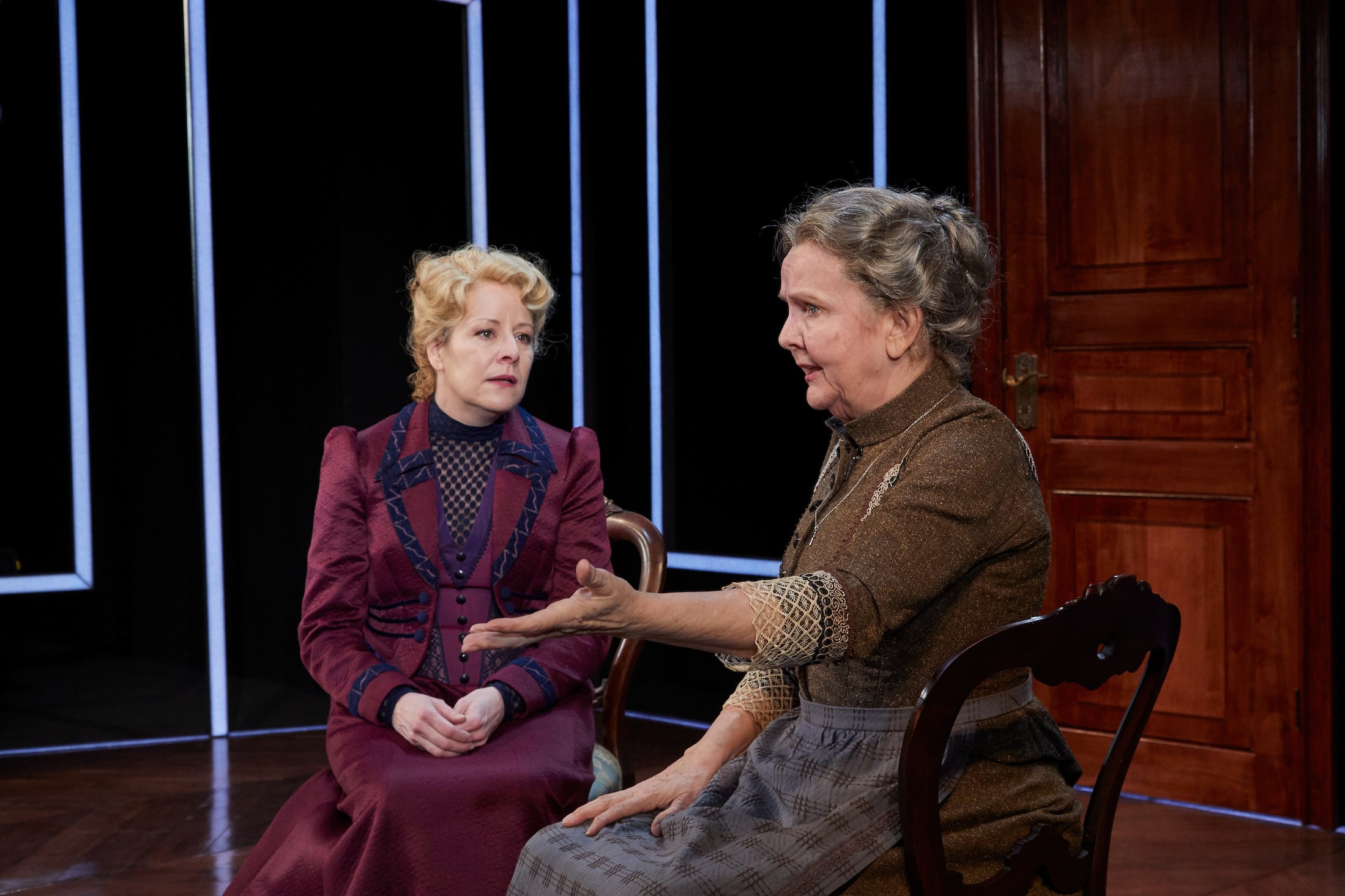Review of The Music Man, The Goodspeed
Watching The Music Man, now in a colorful revival at The Goodspeed, directed by Jenn Thompson, is to be transported to a quintessential American myth: the insular small-town invaded by invidious forces from without. It’s the story of a town—against modernization, against outsiders, against any defiance of the status quo—that says a lot about the ethos of the heartland. It’s played for laughs, sure, and in this version of the venerable musical, the town has been integrated—a nod to the progressive aspects of Iowa. Still, “Stubborn, Iowa” expresses the attitude of the place. It’s not about to change, much—and neither has this time-honored musical.
Harold Hill (Edward Watts), center, and the cast of The Goodspeed’s production of The Music Man, directed by Jenn Thompson (photo by Diane Sobolewski)
Into River City comes “Professor” Harold Hill (Edward Watts). He takes up the challenge of hoodwinking the locals with his particular brand of chicanery after hearing Iowa described as nearly impregnable. That’s in the opening scene, the song “Rock Island” an acapella wonder that gets us off to a rousing start, as a group of salesmen bemoan their lot in life, with Hill mentioned as the scoundrel who gives them all a bad name.
Olin Hill (Kent Overshown), Ewart Dunlop (Jeff Gurner), Oliver Hix (C. Mingo Long), Jacey Squires (Branch Woodman) (photo by Diane Sobolewski)
It’s not long before we’re running through all the well-known chestnuts from this packed score—“Ya Got Trouble,” “76 Trombones,” “’Til There Was You,” “Gary, Indiana,” and, particularly enjoyable here, the barbershop quartet numbers featuring Branch Woodman, C. Mingo Long, Jeff Gurner, and Kent Overshown. Mostly everyone is equal to their tasks, making these wonderful tunes captivate, but the story never quite seems to catch fire. In part that’s because Watts’ Hill, good-looking to a fault, seems like a less than confident confidence man. He’s merely competent rather than compelling. He should own this thing because, after all, it’s Hill’s change in attitude that drives the whole locomotive here. We expect him to be cavalier only to become complicit in his own undoing—which might be the making of him. Here he’s too well-mannered so that we never really question his motives.
Marion (Ellie Fishman), Harold Hill (Edward Watts) (photo by Diane Sobolewski)
As Marion “the librarian” Paroo, the love interest who takes a shine to Hill (though she early discovers his lack of bona fides), Ellie Fishman is winsome, delivering her songs, like “My White Knight,” with all the sweetness required and playing hard-to-get with aplomb, though you might find yourself wishing she had a few more solos. She acts more blithely indifferent than alienated by the gossip going the rounds.
Marion (Elliie Fishman), Mrs. Paroo (Amelia White), Winthrop Paroo (Alexander O’Brien)
As the lisping Winthrop Paroo, Alexander O’Brien is engaging and the other children handle themselves well, including Katie Wylie as Amaryllis. There’s some wonderful support by Stephanie Pope as Eulalie Mackecknie Shinn, the mayor’s wife and the local grande dame, by Amelia White as Mrs. Paroo, and by the ladies who gossip, doing their “Pick-a-Little, Talk-a-Little” number full justice.
Maud Dunlop (Kelly Berman), Mrs. Squires (Victoria Huston-Elem), Marion (Ellie Fishman), Eulalie Mackecknie Shinn (Stephanie Pope), Ethel Toffelmier (Cicily Daniels) (photo by Diane Sobolewski)
In fact, it’s the group numbers that are best here—the quartet, the ladies (and both groups move down the aisles to let us sample their dulcet tones up close)—and also the worked up dance numbers, especially Juson Williams, as Hill’s crony Marcellus, leading the teens in “Shipoopi” with rakish charm.
Marcellus Washburn (Juson Williams) and the cast of The Music Man (photo by Diane Sobolewski)
The scenery by Paul Tate DePoo III is lively and the costumes by David Toser are jaunty. The staging and choreography, by Patricia Wilcox, can feel a little crowded at times, and the whole production feels more respectful than revivified. The stubbornness of Iowa might have infected the whole, or it might be that the very reason to revive this show—to wink at middle-America’s long-established and greatly to be mourned love affair with con artists—requires a bit more bite and less reverence. Like the man said, ‘you gotta know the territory!’
Eulalie Mackecknie Shinn (Stephanie Pope, standing second from left) and the cast of The Music Man
The Music Man
Book, Music, and Lyrics by Meredith Willson
Story by Meredith Willson and Franklin Lacey
Directed by Jenn Thompson
Music Direction by Michael O’Flaherty
Choreography by Patricia Wilson
Scene Design: Paul Tate dePoo III; Costume Design: David Toser; Lighitng Design: Paul Miller; Sound Design: Jay Hilton; Wig & Hair Design: Mark Adam Rampmeyer; Assistant Music Director: F. Wade Russo; Orchestrations: Dan DeLange; Production Manager: Erica Gilroy; Production Stage Manager: Bradley G. Spachman; Producer: Donna Lynn Cooper Hilton
Cast: D. C. Anderson, Iman Barnes, Kelly Berman, Elizabeth Brady, Cicily Daniels, Shawn Alynda Fisher, Ellie Fishman, Damien Galvez, Jeff Gurner, Maddiekay Harris, Victoria Huston-Elem, Elise Kowalick, Ryan Lambert, Danny Lindgren, C. Mingo Long, Matthew B. Moore, Alexander O’Brien, Kent Overshown, Stephanie Pope, Raynor Rubel, William Daniel Russell, Benjamin Sears, Edward Watts, Amelia White, Corben Williams, Juson Williams, Branch Woodman, Katie Wylie
The Goodspeed
April 12-June 20, 2019
















